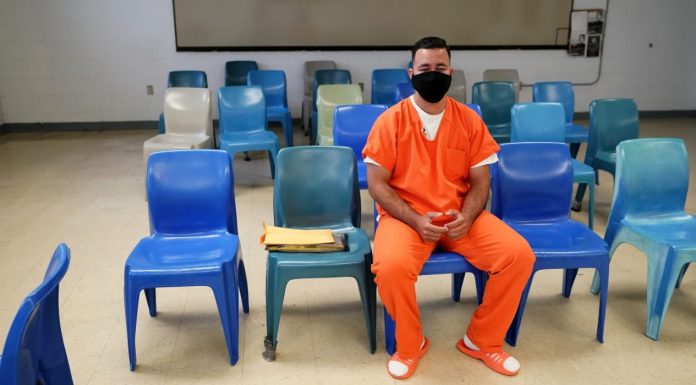(Headline USA) Alexander Martinez says he fled from homophobia, government persecution and the notorious MS-13 gang in El Salvador only to run into abuse and harassment in America’s immigration detention system.
Since crossing the border illegally in April, the 28-year-old has bounced between six different facilities in three states. He said he contracted COVID-19, faced racist taunts and abuse from guards and was harassed by fellow detainees for being gay.
“I find myself emotionally unstable because I have suffered a lot in detention,” Martinez said last week at Winn Correctional Center in Louisiana. “I never imagined or expected to receive this inhumane treatment.”
The number of detainees has more than doubled since the end of February, to nearly 27,000 as of July 22, according to the most recent data from U.S. Immigration and Customs Enforcement.
An agency spokesperson said ICE generally is committed to ensuring detainees are in a safe, secure and clean environment, are provided comprehensive medical care and have their concerns and complaints addressed by staff in writing.
But ICE detainees at the Bergen County Jail in New Jersey filed an administrative complaint last month with Homeland Security’s civil rights office seeking an investigation into allegations including poor sanitary conditions and medical neglect during the pandemic.
“At the end of day, we’re detainees, not inmates,” said Jean Claude Wright, a 38-year-old native of Trinidad and former U.S. Air Force officer named in the complaint. “But this is worse than prison.”
ICE detainees at the Plymouth County House of Corrections in Massachusetts similarly sent a letter to supporters in June, detailing issues like restrictions on visits.
Allison Cullen says she hasn’t been able to visit her husband, a Brazilian national, since before the pandemic.
The couple’s youngest child was only a few months old when Flavio Andrade Prado was detained, and he hasn’t seen his now-2-year-old daughter in person in months, she said.
“We’re in this never-ending limbo,” said Cullen, a U.S. citizen from Brockton, about 25 miles south of Boston. “There is no easy way to talk to my kids about what’s going on and when Dad is coming home.”
The rising detentions is a sore point for President Joe Biden’s pro-open-border allies, who hoped he would reverse his predecessor’s pro-law-enforcement approach.
Biden campaigned on ending “prolonged” detention and use of private prisons for immigration detention, which house the majority of those in ICE custody.
“We’re at this really strange moment with him,” said Silky Shah, executive director of Detention Watch Network, which advocates for ending immigration detention outright. “There’s still time to turn things around, but his policies so far haven’t matched his campaign rhetoric.”
Immigration opponents argue that a more troubling trend than the rise in detentions is an apparent drop-off in ICE enforcement in cities and towns.
As of last month, more than 80% of detainees had been apprehended by Border Patrol officials, and less than 20% by ICE agents, the ICE data shows. Last July under Trump, 40% of detainees were picked up by the Border Patrol, and 60% by ICE.
That means most of those in detention were apprehended trying to enter the country illegally, not from local immigration enforcement, said Andrew Arthur, a fellow at the Center for Immigration Studies, which advocates for lower immigration.
“We’re simply not enforcing immigration law in the interior of the country,” he said.
Martinez, the Salvadoran national, cleared his initial screening in May, which determines whether an asylum-seeker has a “credible fear” of persecution in their homeland.
But his lawyers say he’s being detained because officials believe he’s a member of the MS-13 gang.
Martinez says he fled El Salvador after he and his family received death threats because he testified against the gang in the killing of one of his friends. He says investigators tried to get him to testify in other gang-related murders but he was reluctant because he had not witnessed those crimes.
“I was very scared,” Martinez said. “I told the investigators that I was going to leave the case. I didn’t want to go through the process anymore because I don’t want them to hurt my family, let alone me.”
But since stealing his way into the US—into what he thought would be the warm embrace and safe, cradling arms of the Biden administration—he has continued to live in fear.
Martinez says he’s asked to be placed in solitary confinement, fearing for his safety.
Two detainees who harassed him for being gay were moved, but ICE officials later sent him to a higher-security unit where he said many gang-affiliated detainees are housed.
He says he spends most of his days in his cell, with limited access to communications and recreation.
“It’s really difficult and miserable, and I’m all alone all the time,” Martinez said. “I’m a good person. This treatment is inhuman.”
He wants to settle in San Jose, California, where a friend promised to help him find work. He wants to send money back to El Salvador—his mother has cancer and his younger sister is in college.
“I just want what everyone wants,” Martinez said, “to get out, be free and help support my family.”
Adapted from reporting by the Associated Press

